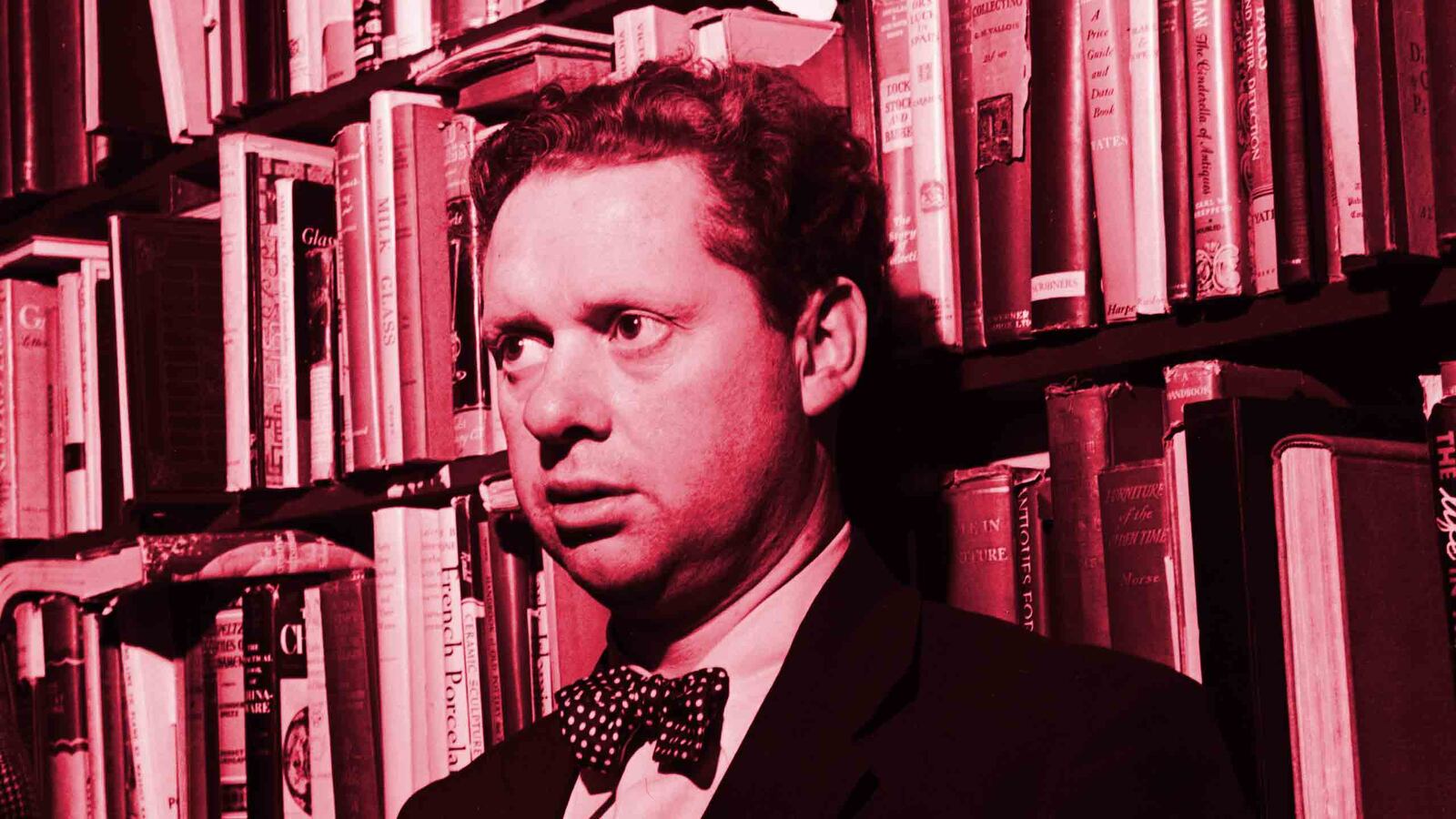While it is true enough to say that I have spent the last six Christmases alone, due to some events that have transpired in my life, I also feel like the statement is not 100 percent accurate.
Physically it will just be me. I’ll work, I’ll write, I’ll take a train somewhere and walk in the woods, and hope that the next Christmas will find me in the life I am fighting to make for myself. That is all true. But I also have several companions, one being Dylan Thomas and a work he wrote and then recorded, that changed not only how I listen to the world but also Christmas itself, and, paradoxically, memories that have yet to be made.
If you know Thomas’s work, it’s likely because you read “Do not go gentle into that good night,” his poem from 1951 that implored his father to fight against death—“the dying of the light,” as it were. At this time of year, we are also apt to attend a holiday staging of Thomas’s short story, “A Child’s Christmas in Wales,” which can be quite different from the story he wrote. That’s because the story didn’t have much of a narrative through-line, being a series of memories of what it was like for the narrator to experience his first few Christmases, when the snow of the season always seemed whiter than it would later on in life, in adulthood, when snow so often ceases to be wonder and becomes mere precipitation.
I love the story, which Thomas sold to Harper’s Bazaar in 1950 for a much-needed $300. A legit wreck, Thomas was often drunk and he always needed money. An elderly ex-editor of mine once told me how he and some friends at a Midwestern college pooled their money in the early ’50s to buy Thomas some new teeth. He was in his late thirties. When you are in your late thirties and you have need of charity for new teeth, life is probably grinding you down somewhat.
This might have been one reason I turned to Thomas and “A Child’s Christmas in Wales” in my own late thirties, as I officially gained—well, emotionally, anyway—nub status. A ground down eraser incarnate, rubbery shavings on all sides. To keep going, I forced myself to walk epic distances. By the end of the year, I’d be up around 3,000 miles, and a lot of those final walks that occur for me each December feature Dylan Thomas sounding in my head.
I am listening to him read—rather, perform, enliven, make more dimensional than a Christmas tree—the work that invented the modern audiobook. It also remains the best one ever made, and it’s something you should make a point of hearing this holiday season.
Thomas was a poet who had a radio gig in Wales. His income was cobbled together, this being one of the strands. A number of producers, at various points, suggested he do a segment on Christmas and how it functions in memory, what it means to live it as a child. A proto-version of what became the more famous, poeticized short story went out over Welsh airwaves in 1944. Thomas then approached the BBC to see if they’d let him have a go. He hoped to do it live on air for them, which they wanted no part of, thinking he read in breathless histrionics, which just wouldn’t do.
Well, it would have done, not that Thomas was this manic, out-of-control reader who wheezed his way through his lines. But he stuck with this performance piece, the title always changing, until Harper’s Bazaar conferred upon it the title it’s been known by ever since.
In 1952, Thomas was touring America, which is far less glamorous than it sounds. He was reading at colleges, essentially, then getting sloshed in the bar, then moving on to the next school, getting sloshed—drink, read, sleep, rise, repeat. Staying at New York’s Chelsea Hotel, he was approached by Barbara Holdridge and Marianne Roney, two recent college grads who were trying to make a buck with spoken word recordings of classic texts.
The classic bit hadn’t gone very well to date—they had tried with some Shakespeare recordings, but there was no interest. Dylan Thomas wasn’t classic yet. In a way, I don’t like to think of him as classic at all—not because he wasn’t good enough—but because he sparked and burned with too much life when he was at his best, and the word “classics” always feel unanimated to me, which the Dylan Thomas of “A Child’s Christmas in Wales” never was.
So on February 22, two months after Christmas, a tippled Thomas took his place in front of a microphone to make an album. For Side A, he recorded five poems, “Do not go gentle into that good night” among them. When I listen to that recording in particular, which is a far less common occurrence for me, it is easy to hear Thomas steering the directive once meant for his father back towards himself.
There are times in this life where we know two things more particularly than we feel we can know anything else. One of them is when we are aware that a sizable fraction of our personage is subsumed in some morass we are trying not to fall into completely. The second is when we know our hold on the ledge above is about to fail.
Hopefully, in those instances, life also has a B side, the side yet to come, the side that can be both literal and figurative converse. Flip me over, baby. Thomas was asked what he wished to record, among his poems, to fill up this B side of his on this day of February 22. He suggested not a poem, but rather a story with poetic elements. He suggested, of course, “A Child’s Christmas in Wales.”
When I’m walking and listening to Thomas’s reading on headphones, it’s difficult not to shut my eyes as I fly to somewhere else. His hold on you is substantial, as you’re ensconced in a world of dreaming about what Christmas will bring, quirky neighbors, your own memories of those friends you thought you’d be close to forever, whose last names you have to work a little to remember now.
This is very much a performance piece, almost like a musician has begun playing a score. Thomas’s voice speeds up at key moments, retaining its poetic precision, then dips back down again to a normal rate, like a sled coasting at the end of its run down the hill. We are still early enough in the history of texts being recorded for something to signify a bold new idea. In this case, that words intended as words on a page—that is, words unlike a playwright’s words—could have a second market, and a second life and identity, if there was someone skilled enough to perform them. Enter, then, the audiobook as art.
No one could read Thomas like Thomas, and given the fragmentary nature of a prose piece like “A Child’s Christmas in Wales,” that voice becomes a magical elixir that turns bits into a whole, gaps to bridges, concerns towards hopes. Dare I say it turns Christmas pasts into breast-situated stirrings that our greatest days, and our greatest Christmas holidays, of wonder have yet to come? I do.
On the recording of “A Child’s Christmas in Wales,” Thomas delivers what is, to me, the most affecting line in all of literature, when cataloging the presents his young protagonist received at Christmastime: “And books which told me everything about the wasp, except why.”
There is nothing in this life worse than the lack of a “why,” just as there is nothing more restorative than a work of art that offers companionship while acknowledging the problem. A little boy walked with a drum, I walk with the sound of Dylan Thomas in my ears. The best Christmas gifts have a way of growing on you in the future Christmases they maybe weren’t even meant for. This is one of those gifts.






